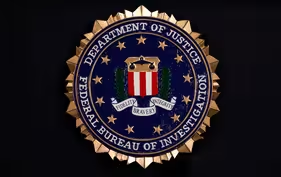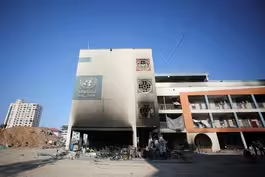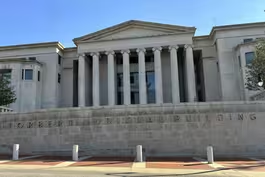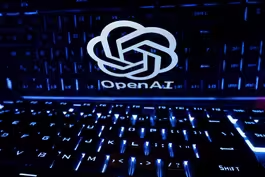
States challenge rule aimed at reducing drifting pollution
Clip: 2/21/2024 | 7m 10sVideo has Closed Captions
Supreme Court hears challenge to rule reducing pollution drifting between states
The Supreme Court heard arguments in a major environmental case over a rule that requires states to stop their air pollution from drifting over to neighboring states. Three states, led by Ohio, are claiming the rule is too costly and they’re asking the court to block the so-called “good neighbor” policy. William Brangham discussed the case with Coral Davenport of The New York Times.
Problems playing video? | Closed Captioning Feedback
Problems playing video? | Closed Captioning Feedback
Major corporate funding for the PBS News Hour is provided by BDO, BNSF, Consumer Cellular, American Cruise Lines, and Raymond James. Funding for the PBS NewsHour Weekend is provided by...

States challenge rule aimed at reducing drifting pollution
Clip: 2/21/2024 | 7m 10sVideo has Closed Captions
The Supreme Court heard arguments in a major environmental case over a rule that requires states to stop their air pollution from drifting over to neighboring states. Three states, led by Ohio, are claiming the rule is too costly and they’re asking the court to block the so-called “good neighbor” policy. William Brangham discussed the case with Coral Davenport of The New York Times.
Problems playing video? | Closed Captioning Feedback
How to Watch PBS News Hour
PBS News Hour is available to stream on pbs.org and the free PBS App, available on iPhone, Apple TV, Android TV, Android smartphones, Amazon Fire TV, Amazon Fire Tablet, Roku, Samsung Smart TV, and Vizio.
Providing Support for PBS.org
Learn Moreabout PBS online sponsorshipWILLIAM BRANGHAM: The Supreme Court heard arguments today in a major environmental case over a rule that requires states to stop their air pollution from drifting over to neighboring states.
Three states, led by Ohio, are claiming the rule is too costly, and they're asking the court to block the so-called good neighbor plan.
Coral Davenport is following all this closely.
She covers energy and environmental policy at The New York Times.
Coral, great to have you back on the program.
So, the good neighbor plan, as I mentioned, says that states have to do everything they can to stop their pollution from sullying their neighbors' air.
The states that are protesting this rule, what is it that they don't like about it?
CORAL DAVENPORT, The New York Times: So this rule is the Biden administration strengthening a rule that was already on the books from the Obama administration.
The Obama rule said that power plants had to control their pollution that goes over state lines and pollutes in other states.
The law actually says that governments have to go back and strengthen this rule every number of years.
The Trump administration did not do that.
The Biden administration went back, they expanded the rule and said, we're also going to apply this to a lot of other industrial pollution, steel mills, factories, cement plants, so a really significant expansion of these controls.
And this is what the industrial states say, this is too much.
This is going to cost millions, if not billions of dollars.
It's a burden.
It's a tremendous economic imposition on the engines of our state.
WILLIAM BRANGHAM: And what is the argument for it?
I mean, I guess broadly speaking, we could say air pollution is bad.
But the argument for stopping this pollution is what?
CORAL DAVENPORT: So, again, the Clean Air Act specifically stipulates that the federal government has to do this.
It says that there's -- and this is sort of interesting because it has to do with the way the winds blow.
You have heard the phrase the westerly winds that blow across the United States.
That's real.
So when you have a lot of air pollution, smog in the middle of the country, it is very well-documented that winds actually blow that to the eastern part of the country.
So when you have a lot of smog in states like Ohio and Indiana, it ends up in the air of Delaware and Connecticut.
The senator from Delaware recently said, we are the tailpipe of the United States.
And there's a lot of evidence that that's true.
So the law created this specific regulation, essentially saying, you states in the middle of the country where this is coming from, you have to clean up to protect your neighbors.
Well, that's part of it.
And the other part is that there's a lot of evidence that this smog is really devastating for human health.
The EPA finds that this rule would indeed be very costly.
It would cost the industry about $900 million a year to comply.
That's huge.
It also finds that it would save the economy, in terms of work days, sick days, increased asthma, respiratory diseases, it would save the economy about $13 billion a year in costs that are measured in public health impacts.
WILLIAM BRANGHAM: And that seems like a pretty clear cost-benefit analysis.
CORAL DAVENPORT: It is a magnitude of difference.
WILLIAM BRANGHAM: The court took up this case on what's known as its emergency docket.
And several of the justices today, including Ketanji Brown Jackson, seemed to take issue with that, asking why this was so urgent.
We talked with our Supreme Court analyst, Marcia Coyle, about this earlier.
Here's what she had to say about this.
MARCIA COYLE: Justice Jackson said she didn't see the emergency.
In fact, she wondered if this was not just a case of the states and industry wanting not to obey the law as the lawsuit proceeded through the D.C.
Circuit.
So what the court has is very unusual here right now.
They always claim that they are court of review, not first view.
And they have nothing to review in front of them, because no lower court has yet to look at the merits of the good neighbor plan.
WILLIAM BRANGHAM: And yet the court seemed very eager to hear this.
CORAL DAVENPORT: And it's very surprising.
One reason is that the entities that are specifically the plaintiffs in this case are the newly covered entities.
So the power plants had already been covered.
This regulation expands the rules and the controls to steel, cement, power plants factories.
Those rules don't kick in, in until 2026.
And yet -- so they're not... WILLIAM BRANGHAM: Directly impacted now.
CORAL DAVENPORT: They're not directly impacted.
And yet they brought this case to the Supreme Court on this emergency filing, saying that this is going to have an emergency impact right now and that the rule essentially needs to be frozen, not implemented at all, until all the litigation is complete.
But it is extremely unusual for the Supreme Court to even hear a case like this.
And that is kind of part of a trend that we're starting to see in this Supreme Court.
WILLIAM BRANGHAM: But this court has shown a good deal of skepticism towards a lot of environmental regulations.
CORAL DAVENPORT: Well, that's always true of a conservative court historically, ideologically.
There's more justices appointed by Republican presidents on this court.
That's not surprising.
Here's what's new.
This is the third in cases that they are taking where, again, the regulation is not fully implemented.
Last year, the Supreme Court heard a case on a water regulation that was not yet implemented, not yet fully on the books.
Very surprising.
Again, analysts said they were surprised that they took that case.
They ended up choosing to sharply limit the regulation.
So even before the government was done writing the regulation, the court had told it, you have to really rein back what you're doing.
Same thing happened the year before on a major climate change regulation.
Again, very unusual for the court to have even taken up the case before the regulation was even done.
The court told the government, you're really restricted in what kind of regulating you do.
That regulation still isn't out.
But the government has -- is taking its marching orders from the court on how it can write these rules.
This is a new trend where it's not just conservative justices expressing skepticism of regulation.
It's taking it to a new level of ruling on these policies before they're even on the books and dictating to the federal agencies what they can then do, kind of handcuffing them before they're even done with their work.
WILLIAM BRANGHAM: And it sounds like, from the arguments today, that the same thing might happen again.
Coral Davenport of The New York Times, always great to see you.
Thank you.
CORAL DAVENPORT: Always great to be here.
App connects drivers to lawyers during traffic stops
Video has Closed Captions
Clip: 2/21/2024 | 8m 9s | App connects drivers with lawyers to de-escalate police interactions during traffic stops (8m 9s)
Ex-informant accused of lying and having ties to Russia
Video has Closed Captions
Clip: 2/21/2024 | 8m 22s | Informant in GOP's Biden investigation accused of lying and having ties to Russia (8m 22s)
Experts discuss future of UNRWA and allegations against it
Video has Closed Captions
Clip: 2/21/2024 | 9m 16s | Experts discuss future of UNRWA in Gaza and allegations some employees helped Hamas (9m 16s)
How an Alabama ruling that embryos are children impacts IVF
Video has Closed Captions
Clip: 2/21/2024 | 7m 20s | How an Alabama Supreme Court ruling that frozen embryos are children impacts IVF (7m 20s)
The potential dangers of AI tool creating realistic video
Video has Closed Captions
Clip: 2/21/2024 | 6m 3s | The potentially dangerous implications of an AI tool creating extremely realistic video (6m 3s)
Providing Support for PBS.org
Learn Moreabout PBS online sponsorship
- News and Public Affairs

FRONTLINE is investigative journalism that questions, explains and changes our world.

- News and Public Affairs

Amanpour and Company features conversations with leaders and decision makers.












Support for PBS provided by:
Major corporate funding for the PBS News Hour is provided by BDO, BNSF, Consumer Cellular, American Cruise Lines, and Raymond James. Funding for the PBS NewsHour Weekend is provided by...





